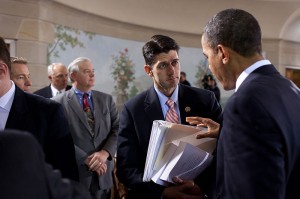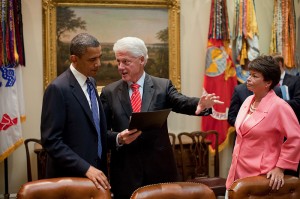 In the last few weeks, the beginning of the 2012 presidential race was fully initiated and created the head way needed to lead America to Election Day.
In the last few weeks, the beginning of the 2012 presidential race was fully initiated and created the head way needed to lead America to Election Day.
Through events that occurred at both the Republican and Democratic National Conventions, each party presented its candidate for office, as well as its platform for policy and political plans.
However, despite these two purposes, nothing between the RNC and DNC came across as similar. This became apparent in not only speeches given by delegates and candidates but also the tone of each setting and even the environment.
Promises were made and criticisms were spoken, but the future of America is still something to be left in question.
With different ideas and beliefs shooting from the right and left-winged sides, it will be difficult for Americans to make the right choice come this November.
Republican National Convention
At the opening of the RNC, attendees and viewers alike only had to look at the crowd to see what kind of individuals the Republicans appeal to — businessmen and the wealthy few.
This type of atmosphere was ideal for the party as the point throughout the week was how businesses needed a president who would support them.
This tone of professionalism dipped a little once movie star Clint Eastwood took the stage with a chair where an invisible President Barack Obama was supposedly sitting. As Eastwood asked questions, Obama was revealed to be stumbling over his words and shooting off foul language.
I admire Eastwood for his work in the movie business, but this unscripted speech left many viewers in a surreal state of mind with no clear conclusion about the real issue.
This problem seemed to carry on throughout the convention.
Instead of discussing clear solutions to the economic turmoil of this country, the RNC was more focused on debating all of the goals Obama did not accomplish in his four years.
During President-elect Mitt Romney’s speech, he said America has grown impatient of Obama’s action to restore the country. While this may be true, Republicans seem to have forgotten that success does not happen overnight.
Four years is a short amount of time in the political world, and policies set in place to help the country take time to grown in effect.

Romney also mentioned Obama being one of the few presidents who could not say he had made America better in four years. This was the argument used to oppose his re-election.
Romney must have also forgotten to mention former President George W. Bush in this category, seeing as how his mistakes are what have taken this country so long to get back up on its feet.
In dealing with one of the largest economic crisis since the Great Depression, we can surely say we are better off than we were four years ago.
According to the Congressional Budget Office, the stimulus created by the Obama administration created almost 5 million jobs and lowered unemployment nearly 2 percent.
Despite this data, though, another aspect of the RNC that followed through all the speeches was a clear lack of recognizing facts.
In comments that Obamacare would cut $716 billion from Medicare, hurting thousands of elderly citizens, it would actually lower the amount of reimbursements to hospitals and insurers by that much.
In a speech made by Vice President-elect Paul Ryan, he blamed the president for closing a General Motors plant in his hometown in 2008 — before Obama was even elected.
This is not to say every politician is correct when giving out information, but the Romney/Ryan campaign seems to have fabricated more than enough in order to pull in greater number of votes.
It seems they did get one thing right, though — “We Can Change It.”
Democratic National Convention
As opposed to the RNC dialogues, one main message that was sent across to Americans during the DNC was a willingness to work together.
With the theme of “Stronger Together,” this tone was evident in not only speeches, but also the audience, featuring a diverse range of individuals from all ages, religions and races.
However, this idea also came about from the importance of Democrats and Republicans working together.

This truth was brought to the forefront in former President Bill Clinton’s speech, who said cooperation works better than constant conflict.
“Because nobody’s right all the time, and a broken clock is right twice a day,” Clinton said.
First Lady Michelle Obama also mentioned in her speech about the need for both parties to work together, not divide themselves further.
In rebutting RNC’s accusations that Obama accomplished nothing, the DNC held Republican’s accountable for the difficulty in achieving what he has — and rightly so.
In the last four years, Obama has tried to work with Republicans on not only health care, but the state of the economy through lowering debt and unemployment.
Despite these attempts at compromise, the lapse of time for implementing change does not merely fall upon Obama but Republicans, as well.
In Obama’s acceptance speech, he too reinforced the notion of reaching agreement and compromise, but showed a resistance to giving up the rights of the middle-class to the wealthy or turning Medicare into a coupon system.
Another important aspect of Obama’s speech that seemed to lack at the RNC was his extensive explanation of how the challenges our country faces will be met.
These topics included everything from jobs and education to energy and our country’s economic debt.
He mentioned outsourcing less professions and exporting additional products, creating incentives for companies to continue providing employment. Obama also talked about the importance of investing in solar power in order to cut our country’s dependency on oil, as well as decreasing American’s deficit by $4 million.
Although some of these goals may be overreaching, Obama certainly provided more information about what these next four years will look like than any speech made during the RNC.
While the journey will not be easy and Americans need to understand there is a long path to the destination, the optimism and choice of a better future still came out supreme at the DNC.
One thing is for sure. While the conventions for both the Republican and Democratic sides have ended, this political journey is far from over.
By CLAIRE MUNN
Senior Editor
clamunn@umail.iu.edu
